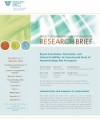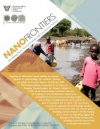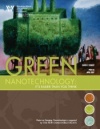
Publications
-
 February 19, 2008
Applying the Chemical Policy Options to Emerging Technologies and Materials: Adaptations and Challenges
Can the template developed in this report for chemicals policy reform be applied in assessing the hazards of emerging technologies and what considerations are involved for state governments?
Steffen Foss Hansen and David Rejeski
February 19, 2008
Applying the Chemical Policy Options to Emerging Technologies and Materials: Adaptations and Challenges
Can the template developed in this report for chemicals policy reform be applied in assessing the hazards of emerging technologies and what considerations are involved for state governments?
Steffen Foss Hansen and David Rejeski
-
 February 15, 2008
Nanotechnology Field Observations: Scouting the New Industrial West
“Note from the Field” article for the Journal of Cleaner Production.
David Rejeski, Deanna Lekas
February 15, 2008
Nanotechnology Field Observations: Scouting the New Industrial West
“Note from the Field” article for the Journal of Cleaner Production.
David Rejeski, Deanna Lekas
-
 February 4, 2008
Biased Assimilation, Polarization, and Cultural Credibility: An Experimental Study of Nanotechnology Risk Perceptions
PEN Brief No. 3
When the public considers competing arguments about a new technology’s potential risks and benefits, people will tend to agree with the expert whose values are closest to their own, no matter what position the expert takes. According to this study, the same will hold true for nanotechnology.
Dan M. Kahan, Paul Slovic, Donald Braman, John Gastil, Geoffrey Cohen, Douglas Kysar
February 4, 2008
Biased Assimilation, Polarization, and Cultural Credibility: An Experimental Study of Nanotechnology Risk Perceptions
PEN Brief No. 3
When the public considers competing arguments about a new technology’s potential risks and benefits, people will tend to agree with the expert whose values are closest to their own, no matter what position the expert takes. According to this study, the same will hold true for nanotechnology.
Dan M. Kahan, Paul Slovic, Donald Braman, John Gastil, Geoffrey Cohen, Douglas Kysar
-
 January 4, 2008
Looking Back on the First Two Years
Biennial Report
This report reviews the Project’s major activities, key contributions, and most significant impacts over its first two years.
Project on Emerging Nanotechnologies
January 4, 2008
Looking Back on the First Two Years
Biennial Report
This report reviews the Project’s major activities, key contributions, and most significant impacts over its first two years.
Project on Emerging Nanotechnologies
-
 December 12, 2007
A Survey of Environmental, Health and Safety Risk Management Information Needs and Practices among Nanotechnology Firms in the Massachusetts Region
PEN Brief No. 1
John Lindberg and Margaret Quinn, University of Massachusetts Lowell
December 12, 2007
A Survey of Environmental, Health and Safety Risk Management Information Needs and Practices among Nanotechnology Firms in the Massachusetts Region
PEN Brief No. 1
John Lindberg and Margaret Quinn, University of Massachusetts Lowell
-
 December 3, 2007
Feynman, Voltaire and Beckett on Nanotechnology
Presentation to Nanopolicy Conference, National Press Club
This presentation examines flaws in the assertion by the U.S. government that the existing regulatory system is adequate to address risks from nanotechnologies and explores actions that need to be taken to help foster successful commercialization of nano products.
David Rejeski
December 3, 2007
Feynman, Voltaire and Beckett on Nanotechnology
Presentation to Nanopolicy Conference, National Press Club
This presentation examines flaws in the assertion by the U.S. government that the existing regulatory system is adequate to address risks from nanotechnologies and explores actions that need to be taken to help foster successful commercialization of nano products.
David Rejeski
-
 July 1, 2007
Where Does the Nano Go? End-of-Life Regulation of Nanotechnologies
PEN 10, July 2007
All materials and products eventually come to the end of their useful life, and those made with nanotechnology are no different. This means that engineered nanomaterials will ultimately enter the waste stream and find their way into landfills or incinerators—and eventually into the air, soil and water. As a result, it is important to consider how various forms of nanomaterials will be disposed of and treated at the end of their use, and how the regulatory system will treat such materials at the various stages of their lifecycle.
Linda K. Breggin, John Pendergrass
July 1, 2007
Where Does the Nano Go? End-of-Life Regulation of Nanotechnologies
PEN 10, July 2007
All materials and products eventually come to the end of their useful life, and those made with nanotechnology are no different. This means that engineered nanomaterials will ultimately enter the waste stream and find their way into landfills or incinerators—and eventually into the air, soil and water. As a result, it is important to consider how various forms of nanomaterials will be disposed of and treated at the end of their use, and how the regulatory system will treat such materials at the various stages of their lifecycle.
Linda K. Breggin, John Pendergrass
-
 May 1, 2007
EPA and Nanotechnology: Oversight for the 21st Century
PEN 9, May 2007
As the Environmental Protection Agency (EPA) recently stated, nanotechnology has evolved from a futuristic idea to watch to a current issue to address. A new report by J. Clarence (Terry) Davies considers various oversight tools for dealing with nanotechnology and proposes a number of action steps for government, industry, and other stakeholders.
J. Clarence Davies
May 1, 2007
EPA and Nanotechnology: Oversight for the 21st Century
PEN 9, May 2007
As the Environmental Protection Agency (EPA) recently stated, nanotechnology has evolved from a futuristic idea to watch to a current issue to address. A new report by J. Clarence (Terry) Davies considers various oversight tools for dealing with nanotechnology and proposes a number of action steps for government, industry, and other stakeholders.
J. Clarence Davies
-
 May 1, 2007
Developing Story: Nanotechnology and Low-Income Nations
NanoFrontiers 2, Summer 2007
The second issue of the newsletter explores the question of whether developing nations will fully share in the anticipated benefits of nanotechnology—predicted to be the driving force for the next industrial revolution.
May 1, 2007
Developing Story: Nanotechnology and Low-Income Nations
NanoFrontiers 2, Summer 2007
The second issue of the newsletter explores the question of whether developing nations will fully share in the anticipated benefits of nanotechnology—predicted to be the driving force for the next industrial revolution.
-
 April 1, 2007
Green Nanotechnology: It’s Easier Than You Think (Report)
PEN 8, April 2007
The ability to eliminate waste and toxins from production processes early on, to create more efficient and flexible solar panels, and to remove contaminants from water is becoming an exciting reality with nanotechnology. This “green nanotechnology” involves designing nanoproducts for the environment and with the environment in mind. Last spring, stakeholders came together to participate in a series of dialogues on the topic, hosted by the Project on Emerging Nanotechnologies. This report highlights the research breakthroughs, industry perspectives, and policy options discussed at those meetings.
Karen F. Schmidt
April 1, 2007
Green Nanotechnology: It’s Easier Than You Think (Report)
PEN 8, April 2007
The ability to eliminate waste and toxins from production processes early on, to create more efficient and flexible solar panels, and to remove contaminants from water is becoming an exciting reality with nanotechnology. This “green nanotechnology” involves designing nanoproducts for the environment and with the environment in mind. Last spring, stakeholders came together to participate in a series of dialogues on the topic, hosted by the Project on Emerging Nanotechnologies. This report highlights the research breakthroughs, industry perspectives, and policy options discussed at those meetings.
Karen F. Schmidt
 February 19, 2008
Applying the Chemical Policy Options to Emerging Technologies and Materials: Adaptations and Challenges
Can the template developed in this report for chemicals policy reform be applied in assessing the hazards of emerging technologies and what considerations are involved for state governments?
February 19, 2008
Applying the Chemical Policy Options to Emerging Technologies and Materials: Adaptations and Challenges
Can the template developed in this report for chemicals policy reform be applied in assessing the hazards of emerging technologies and what considerations are involved for state governments?
 February 15, 2008
Nanotechnology Field Observations: Scouting the New Industrial West
“Note from the Field” article for the Journal of Cleaner Production.
February 15, 2008
Nanotechnology Field Observations: Scouting the New Industrial West
“Note from the Field” article for the Journal of Cleaner Production.
 February 4, 2008
Biased Assimilation, Polarization, and Cultural Credibility: An Experimental Study of Nanotechnology Risk Perceptions
PEN Brief No. 3
When the public considers competing arguments about a new technology’s potential risks and benefits, people will tend to agree with the expert whose values are closest to their own, no matter what position the expert takes. According to this study, the same will hold true for nanotechnology.
February 4, 2008
Biased Assimilation, Polarization, and Cultural Credibility: An Experimental Study of Nanotechnology Risk Perceptions
PEN Brief No. 3
When the public considers competing arguments about a new technology’s potential risks and benefits, people will tend to agree with the expert whose values are closest to their own, no matter what position the expert takes. According to this study, the same will hold true for nanotechnology.
 January 4, 2008
Looking Back on the First Two Years
Biennial Report
This report reviews the Project’s major activities, key contributions, and most significant impacts over its first two years.
January 4, 2008
Looking Back on the First Two Years
Biennial Report
This report reviews the Project’s major activities, key contributions, and most significant impacts over its first two years.
 December 12, 2007
A Survey of Environmental, Health and Safety Risk Management Information Needs and Practices among Nanotechnology Firms in the Massachusetts Region
PEN Brief No. 1
December 12, 2007
A Survey of Environmental, Health and Safety Risk Management Information Needs and Practices among Nanotechnology Firms in the Massachusetts Region
PEN Brief No. 1
 December 3, 2007
Feynman, Voltaire and Beckett on Nanotechnology
Presentation to Nanopolicy Conference, National Press Club
This presentation examines flaws in the assertion by the U.S. government that the existing regulatory system is adequate to address risks from nanotechnologies and explores actions that need to be taken to help foster successful commercialization of nano products.
December 3, 2007
Feynman, Voltaire and Beckett on Nanotechnology
Presentation to Nanopolicy Conference, National Press Club
This presentation examines flaws in the assertion by the U.S. government that the existing regulatory system is adequate to address risks from nanotechnologies and explores actions that need to be taken to help foster successful commercialization of nano products.
 July 1, 2007
Where Does the Nano Go? End-of-Life Regulation of Nanotechnologies
PEN 10, July 2007
All materials and products eventually come to the end of their useful life, and those made with nanotechnology are no different. This means that engineered nanomaterials will ultimately enter the waste stream and find their way into landfills or incinerators—and eventually into the air, soil and water. As a result, it is important to consider how various forms of nanomaterials will be disposed of and treated at the end of their use, and how the regulatory system will treat such materials at the various stages of their lifecycle.
July 1, 2007
Where Does the Nano Go? End-of-Life Regulation of Nanotechnologies
PEN 10, July 2007
All materials and products eventually come to the end of their useful life, and those made with nanotechnology are no different. This means that engineered nanomaterials will ultimately enter the waste stream and find their way into landfills or incinerators—and eventually into the air, soil and water. As a result, it is important to consider how various forms of nanomaterials will be disposed of and treated at the end of their use, and how the regulatory system will treat such materials at the various stages of their lifecycle.
 May 1, 2007
EPA and Nanotechnology: Oversight for the 21st Century
PEN 9, May 2007
As the Environmental Protection Agency (EPA) recently stated, nanotechnology has evolved from a futuristic idea to watch to a current issue to address. A new report by J. Clarence (Terry) Davies considers various oversight tools for dealing with nanotechnology and proposes a number of action steps for government, industry, and other stakeholders.
May 1, 2007
EPA and Nanotechnology: Oversight for the 21st Century
PEN 9, May 2007
As the Environmental Protection Agency (EPA) recently stated, nanotechnology has evolved from a futuristic idea to watch to a current issue to address. A new report by J. Clarence (Terry) Davies considers various oversight tools for dealing with nanotechnology and proposes a number of action steps for government, industry, and other stakeholders.
 May 1, 2007
Developing Story: Nanotechnology and Low-Income Nations
NanoFrontiers 2, Summer 2007
The second issue of the newsletter explores the question of whether developing nations will fully share in the anticipated benefits of nanotechnology—predicted to be the driving force for the next industrial revolution.
May 1, 2007
Developing Story: Nanotechnology and Low-Income Nations
NanoFrontiers 2, Summer 2007
The second issue of the newsletter explores the question of whether developing nations will fully share in the anticipated benefits of nanotechnology—predicted to be the driving force for the next industrial revolution.
 April 1, 2007
Green Nanotechnology: It’s Easier Than You Think (Report)
PEN 8, April 2007
The ability to eliminate waste and toxins from production processes early on, to create more efficient and flexible solar panels, and to remove contaminants from water is becoming an exciting reality with nanotechnology. This “green nanotechnology” involves designing nanoproducts for the environment and with the environment in mind. Last spring, stakeholders came together to participate in a series of dialogues on the topic, hosted by the Project on Emerging Nanotechnologies. This report highlights the research breakthroughs, industry perspectives, and policy options discussed at those meetings.
April 1, 2007
Green Nanotechnology: It’s Easier Than You Think (Report)
PEN 8, April 2007
The ability to eliminate waste and toxins from production processes early on, to create more efficient and flexible solar panels, and to remove contaminants from water is becoming an exciting reality with nanotechnology. This “green nanotechnology” involves designing nanoproducts for the environment and with the environment in mind. Last spring, stakeholders came together to participate in a series of dialogues on the topic, hosted by the Project on Emerging Nanotechnologies. This report highlights the research breakthroughs, industry perspectives, and policy options discussed at those meetings.

